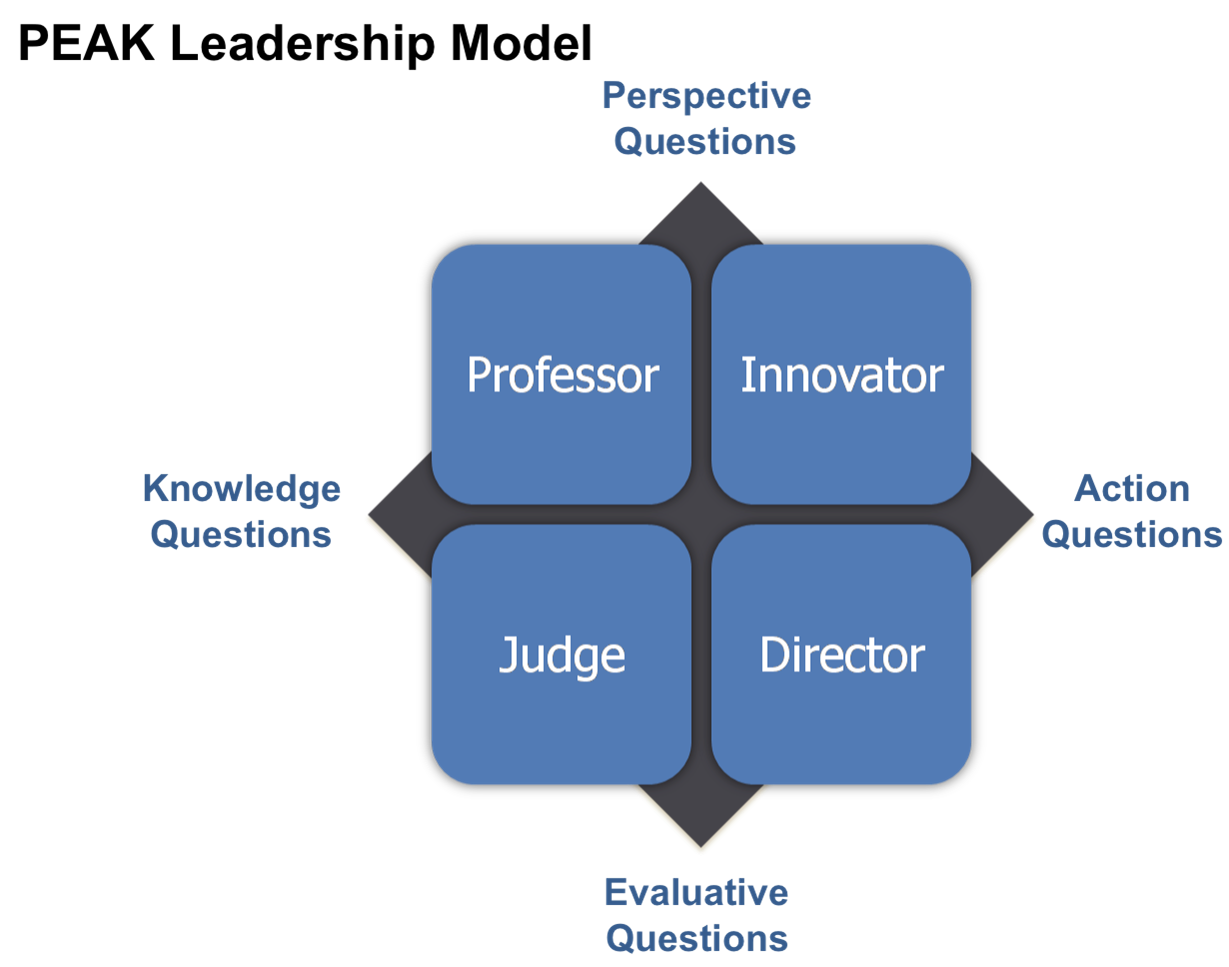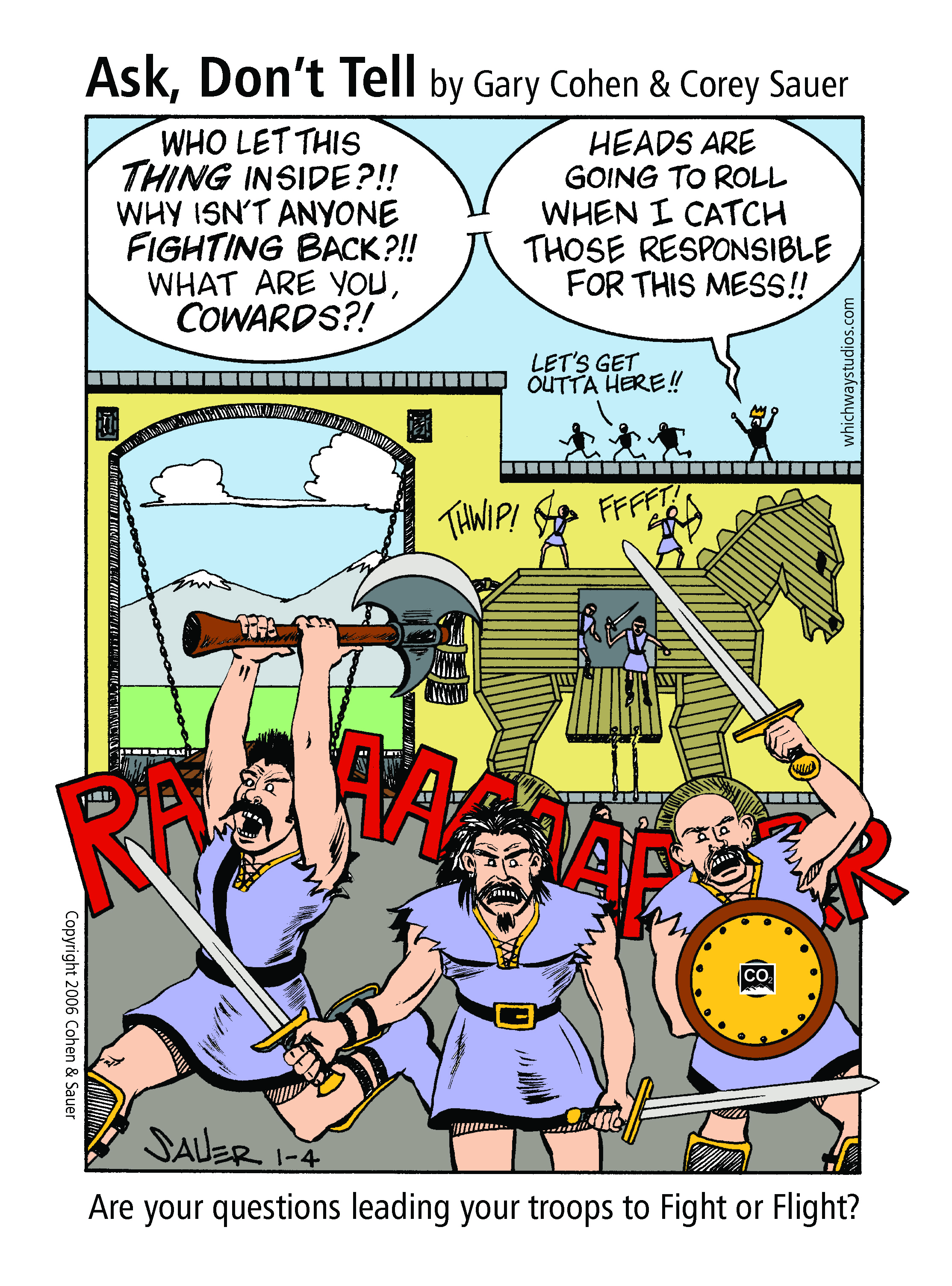Good questions generate thought, focus, and action from the listener. They also convey respect. Is it any wonder that  95% of leaders prefer to be asked questions rather than told what to do? And yet, according to a survey I conducted, these same leaders give instructions 58% of the time rather than asking coworkers for their input.
95% of leaders prefer to be asked questions rather than told what to do? And yet, according to a survey I conducted, these same leaders give instructions 58% of the time rather than asking coworkers for their input.
Rather than trust their instincts, leaders ought to examine their question-asking tendencies in more detail.

Business schools teach leadership, but they don’t teach courses on question-asking. Question-asking is key to this era of specialization—where leaders can’t know everything about everyone else’s jobs. In the 21st century, it’s not possible for leaders to be know-it-alls, nor is it in their or the organization’s best interest to try. Leaders need to ask questions that move others to action and answer.
Just Ask leadership results in better vision, decision making, accountability, productivity, collaboration, and motivation. And it does so without arm twisting or raised voices.
Vision
When only one person supplies vision for an organization, it has a tendency to be myopic. Depth perception is achieved by looking at the same object from multiple vantage points. The more eyes aimed toward the object (or objective), the more likely the vision will be fully formed.
Telling others what you see isn’t ever as compelling as letting them see it for themselves. Leaders should invite coworkers to lift their eyes from their desks, and ask questions like “What would you do if time and funds were unlimited?” or “What organizational assumptions need to be challenged, especially in light of environmental changes?” The result: a broader sense of organizational vision and more buy-in from coworkers, since they will be more committed to the organization’s vision for having helped shape it.
Decision Making
Leaders often operate under the assumption that they are entitled to make any and every decision. It’s a vestige of “The buck stops here!” mentality and World War II era. The impulse comes from the leader’s desire to justify his salary and office, as well as the knowledge that he will be blamed for poor decisions—no matter who in the organiza tion made them. The impulse may be compassionate also; in sharing his wisdom, the leader wishes to alleviate others’ burdens.
tion made them. The impulse may be compassionate also; in sharing his wisdom, the leader wishes to alleviate others’ burdens.
When leaders make decisions that ought to be made by their team members, the whole organization suffers—no matter how smart or capable the leader. Decision making slows to a crawl, for one thing. Nobody wants their decision vetoed, so even if they’re confident in their choice, they run it by the leader anyway. Some may refrain from decision making entirely, since they can get the leader to do their job for them. With so many seeking his input, the leader may have a hard time finding time to go to the bathroom, let alone do his own work.
The more decisions leaders make, the more likely they will make bad ones. They can’t know everything about every one of their coworkers’ jobs and stay abreast of new developments, especially as the organization grows. Bear in mind, too, that with decision making comes responsibility. If leaders take responsibility for their coworkers’ work, what’s the incentive for their coworkers to do so?
Leaders must resist the temptation to make others’ decisions. Instead, they should ask, “Whose decision is it?” and let job descriptions dictate the decision maker. If it’s not their decision to make, they should communicate trust in their coworkers to reach a sound decision. They should act as a resource (asking open-ended questions that provoke thought, like “What’s the biggest risk?” or “Is this the right choice for our brand?”), but under no circumstances say what they would do in their coworker’s place. That practice signals distrust and encourages coworkers to search for the leader’s solutions, not their own.
Accountability & Productivity
Unless leaders set a firm precedent, decision making will gravitate up to the highest ranking members of the organization. By passing decisions down to the appropriate party (the lowest level it can go, typically), leaders create a culture of accountability. Their coworkers know that they will be allowed to make important decisions and that they will be judged based upon the results they achieve.
With accountability comes productivity. Coworkers will take ownership of their work and strive to meet or exceed expectations. In the future, when the leader asks, “How did you achieve this result?” it will come from being happily surprised, not confused or disappointed.
Collaboration 
Just Ask leaders hold individuals accountable for their decisions, but also encourage collaboration. Introverts may be able to draw energy from being alone, but most people don’t. They want to feel part of a team. When leaders supply answers, rather than tap the team’s collective expertise, they may miss the best answer and the opportunity to energize their coworkers.
Too many leaders think it’s about getting the right answer. It’s not. It’s about getting the answer their team can get behind. If these leaders want buy-in, they must ask the team for input. They might ask, “What needs to happen for this to succeed?” or “What haven’t we considered?”
Motivation
 When people aren’t motivated, it’s because they either aren’t being challenged enough or adequately compensated for their efforts. Asking can solve both problems. Questions can challenge coworkers to reach farther and develop new skills or knowledge. While leaders may not be able to offer higher monetary compensation, they can offer credit. Asking indicates a willingness to give others credit for the solutions they devise. In doing so, leaders confer trust and demonstrate interest in their coworkers’ development.
When people aren’t motivated, it’s because they either aren’t being challenged enough or adequately compensated for their efforts. Asking can solve both problems. Questions can challenge coworkers to reach farther and develop new skills or knowledge. While leaders may not be able to offer higher monetary compensation, they can offer credit. Asking indicates a willingness to give others credit for the solutions they devise. In doing so, leaders confer trust and demonstrate interest in their coworkers’ development.
If leaders insist upon doing everything their way, they will always get the same (uninspired) results. That’s because the risks to coworkers—of trying their own, creative approach—outweigh the potential benefits.
Leaders should convey to coworkers that the risks are worth it. They should ask, “What’s your recommendation and why?” or “What would work best for you?” and give coworkers the chance to learn from failure and receive full credit for each success.


Gary, I am excited about these ideas because I help to design business leadership courses and I also use the MITA model where 2-footed questions is the first of 5 phases to renew leadership.
I would love to hear you elaborate a bit more on your notion that “Good questions generate thought, focus, and action from the listener.”
I loved your suggestion that good questions convey respect. It’s a bit like asking because you are curious and you want the other person to shine, as opposed to how we ask at times in ways that diminishes the other person’s offerings. Would you agree that the skill to ask questions is a learned skill – as much as learned skills in all of our careers?
Loved your tie ins with motivation, since it also drives good questions. At MITA we literally assess for leader’s ability to ask and engage questions without bias, in caring ways, that probe deeper meanings and so on. All the very best with this exciting work, because great questions allow for the ambiguity that fuels innovation as we discover solutions together. Excellent challenges here, Gary. All the best as you continue to roll out the suggestions. Keep us posted – this is a terrific topic that could turn around a workplace.
- Log in to post comments
In our work we find that once the question is asked it is very difficult to turn your mind away from it. Anecdotally, my family had an Au Pair living with us who's sister visited us from Norway. I asked her a question she did not have an answer to at the time. Five years later when our family went to Norway for our Au Pair's wedding I was sitting next to her sister again and she said I have thought of an answer to your question. I had long forgotten about the question as the asker and for her it lived on until it was answered. Think of the many times you are asked the right question that at the moment does not have an immediate answer and how it focuses your thoughts and if appropriate moves you to action. With friends who suffer from depression and are willing to talk about it, "I often ask them how is it helping them?" At first it seems an odd question and yet it often gets them to think about it in a new way that often comes up with new insights that they never have had before. Most of my work is with CEO's and I am often asking them how does this behavior help you achieve your goal? or What alternative behavior may help you more quickly accomplish your goal?
I really like the work that has come from Jeff Hawkins for the Redwood Neurological Institute where they are pursuing Artificial Intelligence. Jeff proposes a mental model of how the mind works and what purpose it serves. He arrived at two key purposes: 1) Invariant memory storage and 2) Prediction. The way this impacts us is varied and its relevance to our work on questioning is profound. If we believe that the brain is organized to store and predict, this would mean that each time you are in a conversation you are firstly looking for the best pathway to store the information that is coming in from the communication in order to file it away in a meaning make way. Secondly you are wanting to use it to predict where the other person is going to go with the conversation (finishing the others sentences, either aloud or in your mind). Then when you are correct you validate yourself and it feels good that you accurately filed and predicted. When it flows into dissidence it disrupts your filing and understanding of the situation and you go into self protection and become defensive. Your self identity becomes at stake. This is where what your discussion with diminishing the others offering comes into play. If we can help people see the mental model and use this it will go a long way to letting them open up to the possibility.
We have designed an assessment ceotest.com with the folks that helped build Covey's and Wilson Learning in order to measure a persons ability to trust others, and let go of knowing as well as indicating what type of questioning leadership style they have. This is a 360 instrument. The results are profound. We found that if a leader moves to greater trust of others and letting go of knowing they significantly increase their engagement, alignment and accountability with those they lead.
I do believe that questioning skills is learned and that people can become great at it. I also believe that if people spent more time working on that one skill they would move from good to great in their leadership ability. Most of the attributes of a good leaders can be manifest through great questioning skills. Can you give more explanation about your two footed questioning approach?
- Log in to post comments
Bill Gardam on LinkIn suggested adding this poem, "Six Serving Men" to this Hack by Rudyard Kipling
I KEEP six honest serving-men
(They taught me all I knew);
Their names are What and Why and When
And How and Where and Who.
I send them over land and sea,
I send them east and west;
But after they have worked for me,
I give them all a rest.
I let them rest from nine till five,
For I am busy then,
As well as breakfast, lunch, and tea,
For they are hungry men.
But different folk have different views;
I know a person small—
She keeps ten million serving-men,
Who get no rest at all!
She sends'em abroad on her own affairs,
From the second she opens her eyes—
One million Hows, two million Wheres,
And seven million Whys!
- Log in to post comments
Leaders might not have all the answers, but I agree they need to have the right questions.
I think it starts when leaders have in interest in people, and an interest in complementing their vision with other people perspective.
- Log in to post comments
I agree with you obviously and I would really like to understand your perspective more clearly. I find that peeling the onion back even when their is agreement arrives and subtle differences that truly elevates thinking. What are the ways you are thinking of showing an interest in people and how is it that people will detect a genuine interest verses a disingenuous leader? Can you give more thinking around the iterative perspective of complimenting their vision with other peoples perspective and draw your thoughts out further? Thanks for your comments... Gary
- Log in to post comments
Gary,
You are right on track with "Questions Are The Answers"! I totally agree with this. Thank you for writing this!
When a leader is focused on developing new questions to solve problems or accomplish a goal rather than focused on dispensing their wisdom, they are growing in the learning mode. When they are focused on being the hero with most of the answers, they are stagnating in the scarcity mode.
Think about comparing two equally competent leaders who spend the next three years going down different paths; one being the thoughtful questioner and the other being the thoughtful wisdom dispenser.
~ Which one do you think will have more wisdom at the end of this cycle.
~ Which one will have come up with better overall solutions.
~ Which one would endear their teams by making them feel included, appreciated, and valued?
I think that your article lays out the answers rather clearly that the questioner would win on all accounts.
Thanks again for writing this!
Tom Schulte
Executive Director | Linked 2 leadership
Atlanta, GA USA
www.linked2leadership.com
.
- Log in to post comments





You need to register in order to submit a comment.